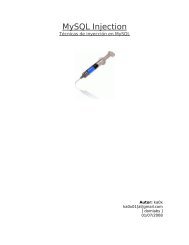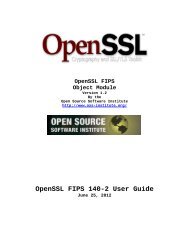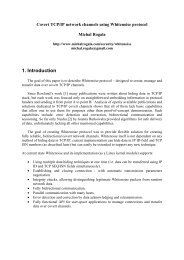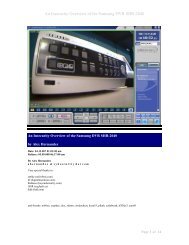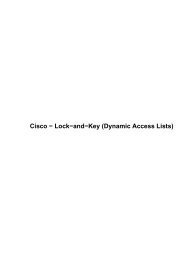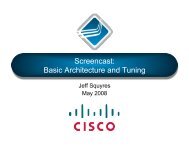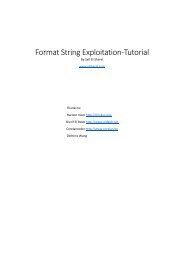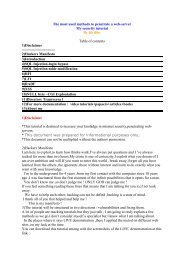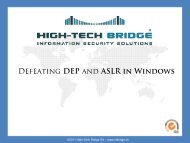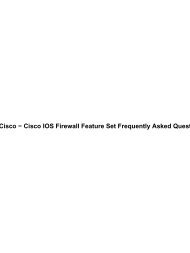x86-64 buffer overflow exploits and the borrowed code chunks - SuSE
x86-64 buffer overflow exploits and the borrowed code chunks - SuSE
x86-64 buffer overflow exploits and the borrowed code chunks - SuSE
You also want an ePaper? Increase the reach of your titles
YUMPU automatically turns print PDFs into web optimized ePapers that Google loves.
4 THE BORROWED CODE CHUNKS TECHNIQUE 5<br />
33 int one = 1;<br />
34 printf("&sock = %p system=%p mmap=%p\n", &sock, system, mmap);<br />
35 if ((sock = socket(PF_INET, SOCK_STREAM, 0)) < 0)<br />
36 die("socket");<br />
37 memset(&sin, 0, sizeof(sin));<br />
38 sin.sin_family = AF_INET;<br />
39 sin.sin_port = htons(1234);<br />
40 sin.sin_addr.s_addr = INADDR_ANY;<br />
41 setsockopt(sock, SOL_SOCKET, SO_REUSEADDR, &one, sizeof(one));<br />
42 if (bind(sock, (struct sockaddr *)&sin, sizeof(sin)) < 0)<br />
43 die("bind");<br />
44 if (listen(sock, 10) < 0)<br />
45 die("listen");<br />
46 signal(SIGCHLD, sigchld);<br />
47 for (;;) {<br />
48 if ((afd = accept(sock, NULL, 0)) < 0 && errno != EINTR)<br />
49 die("accept");<br />
50 if (afd < 0)<br />
51 continue;<br />
52 if (fork() == 0) {<br />
53 h<strong>and</strong>le_connection(afd);<br />
54 exit(0);<br />
55 }<br />
56 close(afd);<br />
57 }<br />
58 return 0;<br />
59 }<br />
Obviously a <strong>overflow</strong> happens at line 21. Keep in mind, even if we are able<br />
to overwrite <strong>the</strong> return address <strong>and</strong> to place a shell<strong>code</strong> into buf, we can’t<br />
execute it since page permissions forbid it. We can’t use <strong>the</strong> return-intolibc<br />
trick ei<strong>the</strong>r since <strong>the</strong> function we want to ”call” e.g. system(3) expects<br />
<strong>the</strong> argument in <strong>the</strong> %rdi register. Since <strong>the</strong>re is no chance to transfer<br />
execution flow to our own instructions due to restricted page permissions<br />
we have to find a way to transfer arbitrary values into registers so that we<br />
could finally jump into system(3) with proper arguments. Lets analyze <strong>the</strong><br />
server binary at assembly level:<br />
0x0000000000400a40 : push %rbx<br />
0x0000000000400a41 : mov $0xe,%edx<br />
0x0000000000400a46 : mov %edi,%ebx<br />
0x0000000000400a48 : mov $0x400d0c,%esi<br />
0x0000000000400a4d : sub $0x400,%rsp<br />
0x0000000000400a54 : callq 0x400868 <br />
0x0000000000400a59 : mov %rsp,%rsi<br />
0x0000000000400a5c : mov %ebx,%edi<br />
0x0000000000400a5e : mov $0x800,%edx<br />
0x0000000000400a63 : callq 0x400848 <br />
0x0000000000400a68 : mov %ebx,%edi<br />
0x0000000000400a6a : mov $0x3,%edx<br />
0x0000000000400a6f : mov $0x400d1b,%esi<br />
0x0000000000400a74 : callq 0x400868 <br />
0x0000000000400a79 : add $0x400,%rsp<br />
0x0000000000400a80 : xor %eax,%eax<br />
0x0000000000400a82 : pop %rbx<br />
0x0000000000400a83 : retq<br />
All we control when <strong>the</strong> <strong>overflow</strong> happens is <strong>the</strong> content on <strong>the</strong> stack. At<br />
address 0x0000000000400a82 we see<br />
0x0000000000400a82 : pop %rbx<br />
0x0000000000400a83 : retq<br />
NO-NX<br />
We can control content of register %rbx, too. Might it be possible that<br />
%rbx is moved to %rdi somewhere? Probably, but <strong>the</strong> problem is that <strong>the</strong>



